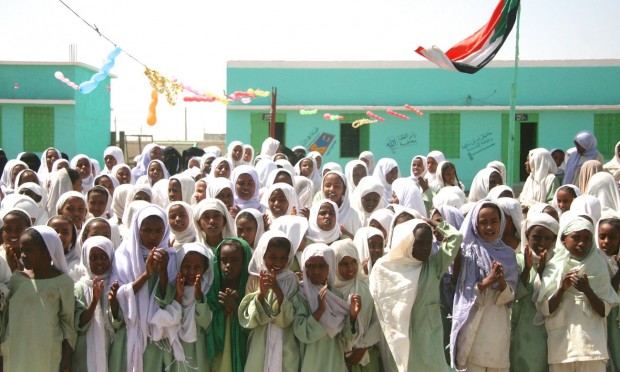Sudan: Society has finally come to grips with the value of educating girls

Um Al-Gura girls school in Nahr Atbara, Kassala state. Primary school completion rates stand at just 26.1% in rural areas of Sudan. Photograph: Yousra Elbagir/Elephant Media
Balad Al-Nabi Hamad, nine, left school after a household accident.
“I was at home on sick leave but I wasn’t sure when I’d be going back. Then I started hearing from the girls in my village that our school had become so beautiful and I decided to finish the school year,” says Balad.
The school had received a grant from the UN children’s agency, Unicef, for improvements, which prompted the board of education, the local council and families in the area to raise 20,000 SDG (around £2,300) and implement extensive plans to expand and renovate Um Al-Gura girls school, Nahr Atbara, Kassala state. The school currently has 605 girls enrolled.
“I have 101 girls registering for first grade next academic year but I can only accept 50 students,” says principal Iman Hassan.
Sudan has one of the highest rates of out-of-school children in the entire Middle East and North Africa (Mena) region, with more than 3 million children aged from five to 13 not enrolled. More than half of those out of school are girls, mostly from rural areas where the female literacy rate is as low as 39% (pdf) and primary school completion is only 26.1%, according to Unicef.
Traditional beliefs that emphasise the role of girls in the household and condone early marriage have meant that many parents take their daughters out of school as they approach puberty.
Yet NGO grants, effective planning from local authorities and national enrolment campaigns are beginning to shift attitudes and boost attendance numbers. In some rural areas, girls are taking exams to enter secondary school for the first time and many who had left school are now returning.
Word of mouth is also playing a part, as girls spread stories of their newly renovated schools to their peers and encourage out-of-school children to return.
“I left school because it was far from my home and it wasn’t so pretty. It didn’t have bathrooms or games or drawings on the walls. But my friends came and told me about all the new things in the school and I decided to come back – I loved it and a lot of the girls in my village came back with me,” says Inshira’h, a third grader (the equivalent of year 4 in the UK) from the Fidiaeb girls school.
Inshira’h lives in a village outside Kassala town, in the suburb of Fidiaeb. The school’s headteacher, Iman Bakri, says she has to convince the girls to leave the grounds at the end of the school day.
In the Abu-Gara’a village in the eastern Gadarif state, a landowner, Taha El-Toum, was so moved by the construction of a single classroom for nomadic children by Unicef and the philanthropic organisation Dubai Cares that he donated a large area of land where a further four classrooms were built.
The village completely uprooted and gathered around the school, changing its name from Abu-Gara’a to Um El-Qura – Arabic for “the Mother of Villages” – with more than four tribes moving to the area hoping to enrol their children.
With only five classrooms, girls are being taught side-by-side with their male counterparts – which is unheard of among such conservative communities.
“I want my daughters to study in segregated classes but I’m compelled to send them to school regardless. I want my daughters to be educated so I have to bite my tongue,” says Ahmed Mohamed Ibrahim, who has three daughters enrolled at the school.
Despite the controversy, enrolment has more than doubled. From 41 students last year, there are now 107 pupils enrolled to start their first year of school in the coming academic year.
Like Um El-Qura, Nahr Atbara is one of many conservative communities in the east of Sudan that have undergone a fundamental shift, with many parents abandoning traditional views on female schooling and urging their daughters to pursue higher education.
“Women are the foundation of the family. The mothers in our community that were educated have children that behave distinctly differently to the children born to uneducated women – whether they have boys or girls,” says Mohamed Ahmed Yusuf, head of the education administration in the Nahr Atbara locality.
“When a child comes home from school, they have a teacher at home to go over their schooling with them. To monitor their clothes, their food, their health – an education that is continued in the home.”
Other regions are now following suit.
“In the Hamish-Koreb region [in Kassala state] there was no education of girls whatsoever. After the national enrolment campaigns implemented by Unicef this year and the last, the locality approached us and requested that we build a girls school for them for the first time in history,” says Ahmed Abbo, education officer for Unicef in the east of Sudan.
The last time the agency built a girls school in Hamish-Koreb, it was demolished.
Now, tribal heads are taking initiative to ensure that their daughters have a place to learn.
“In Hamish-Koreb, Aroma, Shamal Al Delta, and other rural areas all over Kassala, there are now girls schools where it was unheard of for a woman to be remotely educated,” says Majzoub Abu Musa, the minister of education for Kassala State. “In Dabal Oweit and Tahjar, girls are taking their primary school exams to get into secondary school for the first time in history.”
How to submit an Op-Ed: Libyan Express accepts opinion articles on a wide range of topics. Submissions may be sent to oped@libyanexpress.com. Please include ‘Op-Ed’ in the subject line.
- Libya’s HCS invites applicants for key state roles - December 31, 2023
- UK calls on Iran to prevent escalation in Israel-Hamas conflict - November 05, 2023
- Libyan Interior Minister: Immigrant shelter costs a fortune - November 05, 2023


